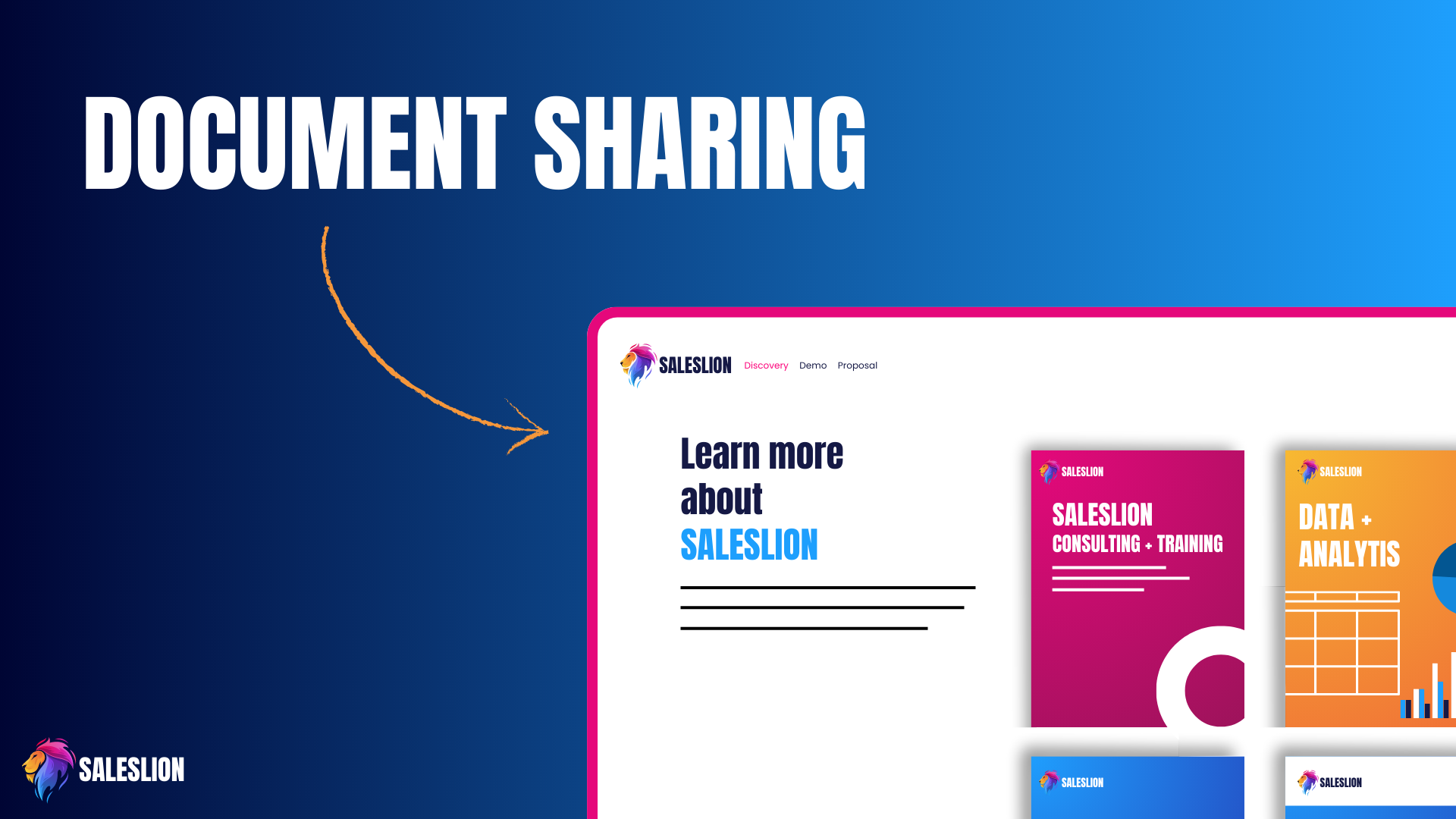In today’s fast-paced and technology-driven business landscape, sales professionals face the challenge of bridging the gap between complex technical solutions and the needs of potential clients.
This is where sales engineers come into play.
Serving as the tie between the sales team and the technical aspects of a product or service, sales engineers play a critical role in understanding customer requirements and demonstrating how technological solutions can address specific business challenges.
In this article, we are going to talk about why sales engineers are important and how digital sales rooms can enhance their role in your company.
Explore This Article:
- Sales Engineer Definition
- Qualities that Make a Great Sales Engineer
- How Digital Sales Rooms Can Help Sales Engineers
- Key Takeaways
Sales Engineer Definition
Sales engineers, like traditional sales reps, are responsible for selling products or services to other businesses. But while sales reps understand the surface-level details about their company’s product or service, sales engineers can communicate the technicalities and complexities of the solutions.
According to an article by Hubspot on how to become a sales engineer, sales engineers specialize in facilitating the sales process for technologically and scientifically advanced products. The role of a sales engineer is typically found in B2B settings, where they are tasked with selling complex products to other businesses.
Sales engineers can be incredibly beneficial for businesses as they can effectively bridge the gap between product development teams and traditional sales teams.
And while traditional sales reps are oftentimes much more adept at communicating the unique value proposition of their company and products and the general results that can be achieved by purchasing the product, sales engineers are crucial elements when it comes to trying to verbalize the details and specialized aspects of the product.

Benefits of Sales Engineers
Especially if you are a B2B or enterprise company that is offering a complex solution to customers, having a team member that understands the complex nature of your product or service has numerous benefits.
Expert Product Knowledge
A sales engineer brings in-depth technical knowledge and expertise to your B2B enterprise company, ensuring that your clients receive accurate and detailed information about your products or services. This expertise helps build trust and credibility with potential customers, leading to higher conversion rates and long-term client relationships.
Customized Solutions
Sales engineers also possess the unique ability to understand complex client requirements and tailor your offerings to meet those specific needs. By providing customized solutions, your company can stand out in the competitive market and deliver greater value to your clients, ultimately driving increased revenue.
Faster Sales Cycle
Finally, since sales engineers can quickly identify and address potential technical roadblocks, your sales processes will be optimized. By proactively tackling these issues, they help to streamline the sales cycle and close deals more efficiently, saving both your company and your clients time and resources.
Qualities that Make a Great Sales Engineer
Along with the benefits that sales engineers offer to B2B companies, here is a list of key qualities that great sales engineers need to possess in order to contribute positively.
1. Technical Expertise
In order to add value, a sales engineer must have a strong understanding of the products or services they are selling, as well as the underlying technologies involved.
This technical expertise is what differentiates sales engineers from traditional sales reps and what allows them to assist customers with detailed questions about the solution being offered.
2. Communication Skills
Sales engineers also need to be able to effectively communicate complex technical concepts to non-technical stakeholders in a clear and concise manner.
Unfortunately though, because many sales engineers are so technical, they struggle to communicate complex ideas in a way that non-technical stakeholders can understand. This is why communication skills are one of the most important qualities of great sales engineers.
3. Problem-Solving
The ability to thoroughly analyze customer needs, identify their unique challenges, propose customized solutions that address these specific requirements, and problem-solve around obstacles is a critical skill for a successful sales engineer.
Problem-solving in sales roles is not only crucial for being able to resolve problems quickly, but also to accurately anticipate problems and create solutions before the trial even arises.
4. Adaptability
Because the world of sales is evolving and continually growing more competitive, just like in all sales roles, flexibility and adaptability are crucial.
Sales engineers must be able to adapt to different sales situations and quickly adjust their approach based on the client’s requirements and preferences.
5. Relationship-Building
Similarly to communicating complex ideas in a simple way, some sales engineers also struggle with the relationship-building part of the role.
But even though their expertise is in the technical, establishing and maintaining strong professional relationships with clients and colleagues is essential for long-term success as a sales engineer as well.
6. Presentation Skills
Sales engineers should be able to deliver engaging and informative presentations to demonstrate the value of their products or services.
This is an especially important skill as it ensures that prospects understand the solution and become interested in purchasing it.
To achieve this, sales engineers should focus on tailoring their presentations to address the unique needs and pain points of each client, highlighting how their offering can provide tangible improvements to the prospect’s business operations or bottom line. In doing so, sales engineers not only increase the likelihood of converting prospects into customers but also lay the foundation for long-term, successful business relationships.
7. Negotiation Skills
Negotiation is an important part of successful sales processes. Fostering collaboration between customers and the company is crucial for not only improved customer satisfaction but also increased customer retention rates.
Sales engineers must be skilled negotiators, as they often need to find mutually beneficial solutions for both their company and the client. This negotiation can help customers feel valued and genuinely served.
8. Continuous Learning
The final quality, and possibly the most important, that makes a great sales engineer great is the habit of continuous learning.
The technology landscape is constantly changing, so sales engineers should be committed to staying up-to-date with industry trends and advancements to remain competitive in their field.
Dedication to ongoing professional development will not only equip sales engineers with the knowledge and expertise needed to effectively address clients’ unique challenges but also enables them to anticipate future market shifts and proactively adapt their approach accordingly.
This can also allow sales engineers to both consistently deliver cutting-edge solutions and add value to both their clients and their organization.
How Digital Sales Rooms Can Help Sales Engineers Communicate with C-Suite Executives
As stated before, sales engineers are extremely adept at understanding the complexities and technicalities of the product or service that they are selling. Unfortunately, this also means that sometimes it is difficult to break down a complex idea into a simple one that can be understood by non-technical stakeholders in the sales process.
This can be a significant challenge to sales engineers.
Luckily though, digital sales rooms can assist with this problem. Referencing the Saleslion digital sales room specifically, digital sales rooms are effective at assisting B2B and enterprise companies with communicating their complex products in simple ways.
In fact, an article about the 12 best sales enablement software of 2023, states that as opposed to plug-and-play digital sales rooms, Saleslion provides personalized sales experiences so that complex ideas can be easily communicated in consumable ways.
Below are some of the ways in which digital sales rooms can help sales engineers communicate with non-technical stakeholders.
Centralizing Information
Digital sales rooms can assist sales engineers by providing a centralized platform where to organize and present technical information in a structured manner.
In these rooms sales engineers can create dedicated sections or folders for different aspects of the solution, making it easier for C-suite executives to navigate and understand the information.

Interactive Features
Digital sales rooms also allow sales engineers to create interactive features and multimedia presentations that convey complex technical concepts effectively.
This can include explainer videos, solutions boards, and pricing calculators.
Sales engineers can also incorporate visual aids, videos, infographics, and interactive elements to engage C-suite executives and simplify the understanding of technical information.
Customizable Content
Sales engineers can tailor the content within digital sales rooms to meet the specific needs and interests of C-suite executives.
They can focus on high-level benefits, ROI, and strategic implications rather than diving deep into technical details. By customizing the content, sales engineers can ensure that it aligns with the executives’ perspective and sales goals.
Real-Time Collaboration
One of the biggest benefits that sales engineers can receive from digital sales rooms is improved collaboration. Digital sales rooms often include collaboration features that enable real-time interaction between sales engineers and C-suite executives.
This functionality allows for a streamlined sales process and improves comprehension of the solution and the benefits it provides.
Access to Additional Resources
Digital sales rooms can provide easy access to supplementary resources, such as whitepapers, case studies, or technical documentation.
Sales engineers can use those relevant materials to provide more in-depth technical information for any stakeholders who desire a deeper understanding without impacting the simplicity of the whole sales process.
Analytics and Tracking
Digital sales rooms also offer analytics capabilities, allowing sales engineers to track engagement and assess which parts of the content are most impactful.
This data can help sales engineers identify areas of interest for C-suite executives and tailor future communications accordingly.
By leveraging the capabilities of digital sales rooms, sales engineers can bridge the communication gap between technical aspects and non-technical stakeholders, enabling them to effectively convey the value and benefits of their solutions to all types of customers.
Key Takeaways
In summary, sales engineers are vital in bridging the gap between complex technical solutions and customer needs in the fast-paced business landscape.
Their unique blend of technical expertise and sales familiarity allows them to understand customer requirements and communicate the value of technological solutions effectively.
And while some sales engineers might struggle with the communication of complex technical ideas to non-technical customers, digital sales rooms can help alleviate that problem quickly and effectively.
So, if you are interested in learning more about the Saleslion digital sales room, reach out to us today!